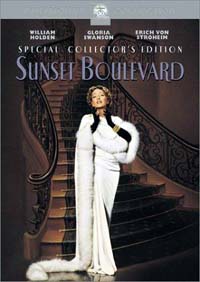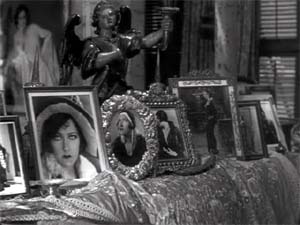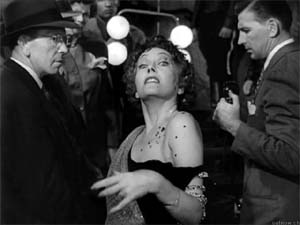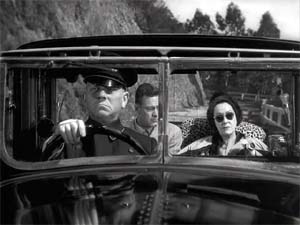Dec 25, 2025
Dec 25, 2025
 Sunset Boulevard is one of the greatest movies ever made. A black-and-white gem of a movie by Billy Wilder, the same man who made The Seven Year Itch and Sabrina, Sunset Boulevard is an insider's take on Hollywood - Hollywood shorn of the glamour, or rather a glamour that's gone putrid.
Sunset Boulevard is one of the greatest movies ever made. A black-and-white gem of a movie by Billy Wilder, the same man who made The Seven Year Itch and Sabrina, Sunset Boulevard is an insider's take on Hollywood - Hollywood shorn of the glamour, or rather a glamour that's gone putrid.
The story is about a down and out script writer who lands up, by mistake in Norma Desmond's mansion. Norma Desmond is the greatest star of the silent era. What unfolds is a fascinating tale of how time stands still for an aging star and her greatest fan, her butler, who dutifully keeps writing hundreds of fan letters to her - every day, just so that she can bask in the glory of her stardom, that has long since set, infact which has faded twenty years ago.
The screenplay has also been judged as among the top screenplays to be ever written. It's strange to think that the screenwriter (and director) Billy Wilder actually did not know English when he immigrated to America. Wilder once said: "My English is a mixture between Arnold Schwarzenegger and Archbishop Desmond Tutu." (Wilder was a German speaking Polish Jew. His family had perished in the Auschwitz concentration camp.)
 The movie is a rich mix of pathos, sardonic humour, realism and the burlesque. What impresses the viewer right away is its magnificent sets: the rambling mansion covered in dust; (the film's cinematographer was John F. Seitz who sprinkled dust in front of the camera to give the effect of a musty, mouldy interior); the outrageous swan bed - which I believe was actually some great yesteryear star's bed that was later purchased by the studio as a prop; the solid teak furniture, the thick Turkish carpets and the dimly rooms with hardly any sunlight, with tall standing lamps lit during the day. And most of all - the photographs of Norma Desmond gracing every available surface, tables, mantelpieces, walls, dressing tables - its marvellous how each one of them has the actress in a different pose, in different costumes and expressions.
The movie is a rich mix of pathos, sardonic humour, realism and the burlesque. What impresses the viewer right away is its magnificent sets: the rambling mansion covered in dust; (the film's cinematographer was John F. Seitz who sprinkled dust in front of the camera to give the effect of a musty, mouldy interior); the outrageous swan bed - which I believe was actually some great yesteryear star's bed that was later purchased by the studio as a prop; the solid teak furniture, the thick Turkish carpets and the dimly rooms with hardly any sunlight, with tall standing lamps lit during the day. And most of all - the photographs of Norma Desmond gracing every available surface, tables, mantelpieces, walls, dressing tables - its marvellous how each one of them has the actress in a different pose, in different costumes and expressions.
But what I liked most was the sardonic humour that ensured the movie never slipped into maudlin sentimentality. Here are some of my personal favourites.
- When the hero, scriptwriter Gillis meets Norma Desmond, the greatest star ever, for the first time, and she is affronted by his matter of fact reaction to her identity, he says, as he is leaving - "Next time I'll come with my autograph book or maybe a hunk of cement for your footprints."
- Norma Desmond is crushed by the death of her pet, a chimpanzee and has organized for a burial fit for a king (with a coffin lined with satin and velvet). Gillis who observes the burial from a room above says - "He was one important chimp, the great grandson of King Kong maybe. "
- Norma Desmond's tragedy is that she could not make the transition from silent to talking pictures. She keeps the myth of her everlasting popularity alive by watching her own movies twice a week. On one such occasion she tells Gillis who has by then moved in with her - "There was a time when this business had the eyes of the whole wide world. But that wasn't good enough. Oh, no They wanted the ears of the world, too. So they opened their big mouths, and out came talk, talk, talk..."
GILLIS: "That's where the popcorn business comes in. You buy yourself a bag and plug up your ears."
- To counteract Gillis' complete cynicism and disenchantment with Hollywood, there is Betty Schaefer, a fresh, young Reader (Readers read the script submitted by scriptwriters to the Studios and decide whether they are any good) who believes movies should say something. She reprimands Gillis for wasting his talent and not writing something really meaningful. Gillis retaliates with - "Oh, you're one of the message kids. Just a story won't do. You'd have turned down Gone With the Wind."
On that the Studio executive (the producer) quips, "No, that was me. I said, Who wants to see a Civil War picture?"
- Norma Desmond comes to visit Cecil de Mille, the great producer-director, the man behind The Ten Commandments. His assistant tries to brush her of and says to de Mille - "She must be a hundred years old." DeMille replies wryly - "I hate to think where that puts me. I could be her father."
The movie is a classic noir film and has some superbly dramatic moments. From the first scene when the credits are rolling, with police cars racing down Sunset Boulevard, to the last, when Norma Desmond makes her grand exit as Salome, the movie moves at a relentless pace, which is by itself quite an achievement considering there are no high voltage action sequences. Instead, Wilder skilfully incorporated several suspenseful sequences that climax with startlingly dramatic visuals. These individual sequence climaxes give the movie some of its most macabre and memorable scenes.
[Warning! Spoilers Ahead!]
These are the ones I remember best. Let me know which ones you like the most!
(1) Gillis enters Norma Desmond's bedroom for the very first time. Norma thinks he is the undertaker. Gillis has no clue who has died. She gestures towards a small body that's covered in a rich Spanish shawl. And suddenly a chimpanzee's hair arm slips lifelessly from below the covering.
(2) Gillis recognizes Norma Desmond and quite thoughtlessly says he knows who she is. She used to be big once. Norma draws herself up and haughtily exclaims like royalty- "I AM big. It's the movies that got small".
(3) Seeing one of her own silent movies in her living room she suddenly gets up agitated and exclaims what fools present day producers were to ignore an immortal beauty like her. "I'll show them" she thunders. "I'll be up there again". Her eyes gleam fanatically, she unconsciously adopts a melodramatic posture of the silent movies era, hand outstretched, fingers like claws, raised dramatically, one shoulder raised at an elegant angle, her chin thrust out. It's so easy to see that she forgets she is not enacting a scene.
 (4) And ofcourse Wilder's and Swanson's tour de force - the last scene - in which Nora descends the staircase, thinking she is Salome, in Paramount Studios. She is surrounded by journalists who are furiously clicking photographs of a murderess. She thinks they are cameramen at the studio. She walks down the stairs, like a queen, her head held high, her face towards the arc lights, with wild makeup (she has powder smothering her face), and an even wilder get up (spangled glitters all over her gown, an over-the-top hat, glitters on her arms) and stops at the last stair and says - eyes staring madly and at the same time quite luminescent in its expressiveness, "Mr. De Mille, I'm ready for my close up." Its one of the most macabre climaxes I have ever seen in any movie.
(4) And ofcourse Wilder's and Swanson's tour de force - the last scene - in which Nora descends the staircase, thinking she is Salome, in Paramount Studios. She is surrounded by journalists who are furiously clicking photographs of a murderess. She thinks they are cameramen at the studio. She walks down the stairs, like a queen, her head held high, her face towards the arc lights, with wild makeup (she has powder smothering her face), and an even wilder get up (spangled glitters all over her gown, an over-the-top hat, glitters on her arms) and stops at the last stair and says - eyes staring madly and at the same time quite luminescent in its expressiveness, "Mr. De Mille, I'm ready for my close up." Its one of the most macabre climaxes I have ever seen in any movie.
Now about the characters. The three main characters are Gloria Swanson as Norma Desmond, William Holden as Gillis and Erich Von Stroheim as Max the butler. I found it very interesting the manner in which the director decides to "hint" to the audience that Gillis was unconsciously slipping into the role of a gigolo.
Norma is showing playing cards with her friends and she asks Gillis to empty the ashtray. A second later when his car is being towed away by the car financiers he begs her for some money - so that he can pay of the car loan people and retain his car. That's the instance when we get an inkling of how things are going to be from now onwards. She keeps him on leash - withholding any payments. Her card companion looks at Gillis meaningfully as he whispers and pleads with Norma for some money. That looks says so much - already people are looking at him as a toy boy. She gives him food, expensive food - champagne and caviar included, buys him designer clothes, lets him stay in her house (wants him to stay) but doesn't pay him any hard cash. The only money he ever gets is from her winnings at her card games.
 Then there is Max the butler (it is only towards the end of the movie that we get to know who he really is) - blindly loyal and devoted. A love that is so servile and yet strangely not pathetic- he loves her so determinedly that he is willing to be her bulter, servant, chauffeur just so that he can be with her, take care of her. In the scene in which he is driving Norma to Paramount Studios to meet Cecil deM ille, for her great comeback, he studies her reflection in the rear mirror of the car (he as chauffeur is driving the car,she is sitting in the back seat) and apologetically tells her that her eye shadow wasn't quite right. He obviously still believes she is the diva she once was 20 years back and that is still as beautiful as when an Indian Maharajah stole her stockings and then hanged himself with it. He painstakingly writes her hundreds of fan letters everyday just so that her fragile sanity does not snap. The scene is which he quietly tells Gillis that he was her director, it was he who had discovered her, and that is actually her first husband - is Wilder's most brilliant touch as a screenplay writer.
Then there is Max the butler (it is only towards the end of the movie that we get to know who he really is) - blindly loyal and devoted. A love that is so servile and yet strangely not pathetic- he loves her so determinedly that he is willing to be her bulter, servant, chauffeur just so that he can be with her, take care of her. In the scene in which he is driving Norma to Paramount Studios to meet Cecil deM ille, for her great comeback, he studies her reflection in the rear mirror of the car (he as chauffeur is driving the car,she is sitting in the back seat) and apologetically tells her that her eye shadow wasn't quite right. He obviously still believes she is the diva she once was 20 years back and that is still as beautiful as when an Indian Maharajah stole her stockings and then hanged himself with it. He painstakingly writes her hundreds of fan letters everyday just so that her fragile sanity does not snap. The scene is which he quietly tells Gillis that he was her director, it was he who had discovered her, and that is actually her first husband - is Wilder's most brilliant touch as a screenplay writer.
While watching Sunset Boulevard I was remembering some of our own movies on the Hindi film industry. The most obvious ones are Rangeela, Khoya Khoya Chand and to some extent Guddi. I'm afraid I have yet to watch Guru Dutt's Kagaz Ke Phool, which I know is a cult movie. Those of you who have watched it, do add your comments here. Guddi had the Bombay film industry as a backdrop but none of its main characters were from the film fraternity. But the other two were about the movie industry - about stars and extras, about those who make it big, and the unsung heroes. And yet neither of them had the gripping realistic feel of Sunset Boulevard, a movie made almost 50 years before. The characters in Sunset Boulevard are flesh and blood characters, with the richness and depth of actual people. Jackie Shroff in Rangeela was simply a flamboyant hero who falls in love. There weren't any layers to his character. Verma didn't bother much about understanding what makes him tick psychologically. Khoya Khoya Chand is a more complex movie, but as is typical of some good Hindi movies, does not give that feeling of completeness, of a perfection in conception and execution that say a Sunset Boulevard does. Soha's character was definitely not memorable, nor was Shiney's. In fact I can't recollect a single scene or dialogue from the movie! Fashion - though a realistic take on glamour lacks the heart of Billy Wilder's Sunset Boulevard.
For though Sunset Boulevard looks at Hollywood unflinchingly, with all its warts, it also shows one of Hollywood's most legendary director-producer - Cecil deMille, in a redeeming golden glow. Infact deMille is the nicest, most likable character, in the entire movie. He is kind, almost paternal, treats an aging delusional star with respect and he is honest, something most other characters in the plot are not (he tries his best to tell Norma that there had been a mistake. His studio hadn't called her up to sign her up for a movie, but to rent her car as a prop). When he sees how much making a grand comeback means to her, he refrains from telling her that her Salome script was trash and that they couldn't possibly make a movie together. "I would if it were possible" - he leaves it at that - which she takes as a "yes"!
Norma comes visiting him when he is in the middle of a shooting. His assistant quite reasonably asks should he just tell her that the director is busy, should he give her the "brush"? DeMille replies, "isn't it enough 30 million fans have already given her the brush"
Some questions that were left unanswered. If any of you have seen this movie or plan to see it, please let me know why -
(1) Why did the butler Max do up the bed that afternoon - even before Gillis had decided to stay on as a hack writer. Was it because he had anticipated that Norma would want him to stay with her and that he would not be able to resist her command?
(2) Can anyone tell me what this dialogue means?
NORMA Salome -- what a woman! What a part! The Princess in love with a Holy man. She dances the Dance of the Seven Veils. He rejects her, so she demands his head on a golden tray, kissing his cold, dead lips.
GILLIS
They'll love it in Pomona.
NORMA
(Taking it straight)
They will love it every place.
---------------------------------------------------------------------------- I understand Gillis is being sarcastic when he says "they'll love it in Pomona" but what does it mean really?
Sunset Boulevard won Academy Awards in the categories of:
(1) Best Art Direction-Set Decoration, Black-and-White (Hans Dreier, John Meehan, Sam Comer and Ray Moyer)
(2) Best Music, Scoring of a Dramatic or Comedy Picture (Franz Waxman)
(3) Best Writing, Story and Screenplay (Charles Brackett, Billy Wilder and D.M. Marshman Jr.)
It was also nominated in the categories of:
(1) Best Picture
(2) Best Director (Billy Wilder)
(3) Best Actor in a Leading Role (William Holden)
(4) Best Actor in a Supporting Role (Erich von Stroheim)
(5) Best Actress in a Leading Role (Gloria Swanson)
(6) Best Actress in a Supporting Role (Nancy Olson)
(7) Best Cinematography, Black-and-White (John F. Seitz)
(8) Best Film Editing (Arthur P. Schmidt and Doane Harrison)
That's an awful lot of nominations! So, as they say on TV film promos, go watch it!

|
The bed was originally owned by French star Gaby Deslys, later revealed to be a Czech. Gaby starred with Al Jolson in a few Broadway plays, particularly Vera Violetta (1912) and a couple others. She died in 1920 from a flu infection. Universal bought the bed at auction and used it in The Phantom of the Opera in 1925, then again in Sunset Boulevard. Don't know where it is today. |

|
Hi Alexis! That's so great! Had done a couple of google searches to find out what the Pomona reference meant - but never found anything! Thanks for the information! Warm regards, Deepanjali |

|
Hi I wanted to know about the reference to Pomona too. I found an internet article that says that from the 30s to the 50s big Hollywood movies were test screened on audiences in cities of Inland Empire, one of them being at the Pomona Fox theatre. Based on feedback from the audiences, movies would then be edited. This apparently happened with The Wizard of Oz for example. Sunset Boulevard is on TV in about 25 minutes and I am looking forward to watching it again. Best wishes, Alexis |